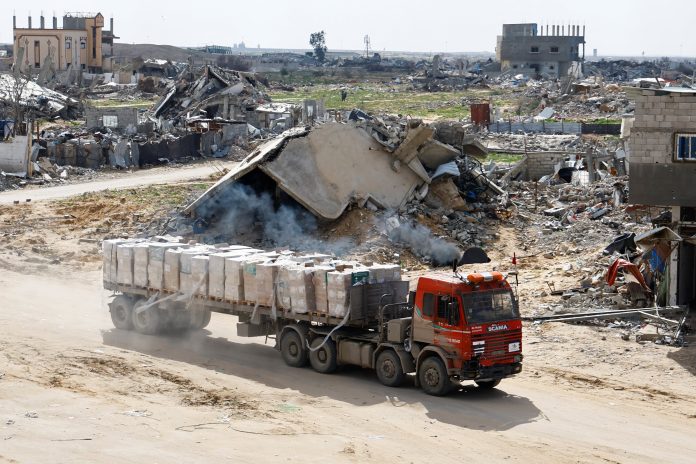– Masood Abdali
Despite international efforts, the prospect of a ceasefire in Gaza remains bleak as Israeli leadership refuses to consider a full military withdrawal, while Palestinian resistance factions hold firm on their demands. A “Map of Partial Redeployment” (MoPR) proposed by Israel on July 10 was swiftly rejected by the resistance, which has insisted on a permanent ceasefire and total Israeli military withdrawal before any prisoner exchange takes place. A revised version presented on July 12 was also dismissed, with negotiators calling it “more rigid than before.”
Former U.S. President Donald Trump, seeking to broker a breakthrough, hosted Qatari Prime Minister and Foreign Minister Sheikh Mohammed bin Abdulrahman Al Thani in Washington in a bid to sway Qatar’s influence over Palestinian factions. The effort, however, yielded no tangible results.
Political Turmoil in Israel
Israeli Prime Minister Benjamin Netanyahu continues to pursue what critics have called a genocidal campaign in Gaza, primarily to maintain his fragile ruling coalition. Former Defense Minister and opposition leader Avigdor Liberman accused Netanyahu of sacrificing Israeli soldiers to preserve political power, particularly by appeasing ultra-Orthodox factions. Liberman denounced the exemption of Haredi yeshiva students from compulsory military service as “an act of treason.”
The controversy over military service exemptions has deepened political divides within the coalition, with several parties threatening to exit the government if the exemptions remain. Netanyahu now leans heavily on the support of far-right ministers Bezalel Smotrich and Itamar Ben-Gvir, both of whom advocate for the complete annexation of Gaza and the West Bank.
Humanitarian Crisis Deepens in Gaza
The humanitarian situation in Gaza continues to deteriorate rapidly. A recent UN report reveals that one in every ten children in the enclave suffers from acute malnutrition. Israeli airstrikes on aid centers have intensified, with 875 people killed in the past six weeks alone. Among them were 20 civilians in a July 14 strike on a relief hub in Khan Younis.
Tragically, even religious institutions have not been spared. On July 17, Israeli shelling of the Holy Family Catholic Church in central Gaza killed two women and injured several others. Days earlier, arsonists targeted the Church of St. George in Taybeh near Jerusalem. Although Netanyahu later issued an apology and facilitated a visit by Jerusalem’s Latin Patriarch, global outrage had already mounted.
Western Inaction and Complicity
Despite internal debates, Western governments have done little to curtail Israeli aggression. The European Union, after weeks of deliberation, announced on July 15 that it would not impose sanctions on Israel. Many observers suspect Israeli Foreign Minister Gideon Sa’ar played a role in this decision after reportedly holding private meetings with several EU foreign ministers just prior to the vote.
The United States has also maintained staunch support for Israel. As Ireland moved forward with a bill to ban imports from illegal Israeli settlements in the West Bank, a coordinated online campaign emerged from six American senators and sixteen House members, opposing the legislation. Although their social media posts appeared independent, their timing and language suggested centralized coordination.
One notable exception came from Slovenia, which officially declared Bezalel Smotrich and Itamar Ben-Gvir persona non grata, effectively banning their entry into the country. Both men are considered key players in Israel’s hardline policies.
Resistance From the Arts
While many politicians remain silent, the global music community has begun to speak out. UK-based band Massive Attack announced the formation of a coalition of musicians facing censorship for supporting Palestinians. The band cited legal threats from groups like “UK Lawyers for Israel” and highlighted the issue in a documentary produced by Led By Donkeys. Notable artists such as Kneecap, Fontaines D.C., and Brian Eno have joined the effort.
Rising Settler Violence in the West Bank
Violence by Israeli settlers in the West Bank has escalated sharply. On July 18, settlers attacked a Palestinian farm in the Jordan Valley, killing 117 sheep using firearms and pellet weapons. This follows weeks of arson attacks, home demolitions, and olive grove destruction across occupied territories.
Psychological Toll on Israeli Forces
The protracted conflict is also taking a toll on Israeli troops. According to Israel’s Ministry of Defense, increasing numbers of soldiers are experiencing trauma and mental health issues, with some resorting to suicide. In one incident, a military excavator was stolen from Gaza and driven into Huwara in the West Bank—a bizarre breach of IDF security that sparked both concern and satire online.
Palestinian Authority’s Political Theater
In the midst of this chaos, Palestinian Authority President Mahmoud Abbas announced elections for the Palestinian National Council to be held by year’s end. However, unlike the 2006 elections, which Hamas won, the upcoming vote will feature only candidates handpicked by the PLO, effectively guaranteeing a result favorable to Abbas and his Western allies. Critics have derided the move as a hollow attempt to revive the defunct two-state solution. Graffiti outside Abbas’s office reads: “NO MORE TWO STATES. WE WANT 48”—a call to reclaim all of historic Palestine.
For many Palestinians, the PA’s latest announcement is nothing more than a distraction tactic engineered by foreign sponsors to preserve an obsolete political order.




